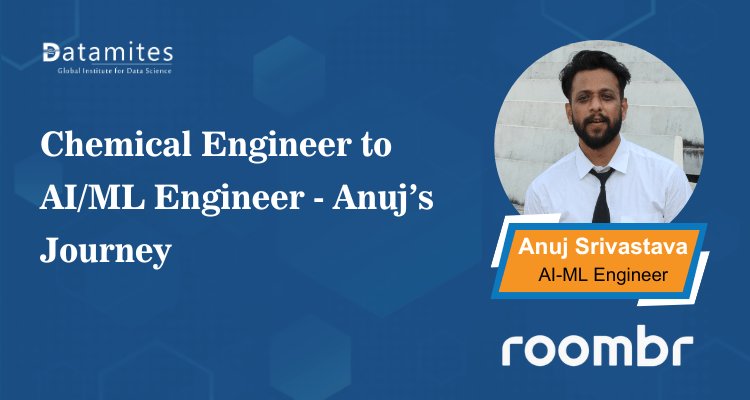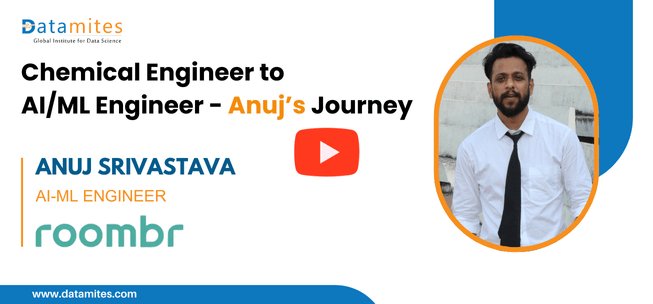Anuj’s Journey from Chemical Engineering to AI/ML Engineer
Anuj’s journey from chemical engineering to becoming an AI/ML engineer is a testament to the power of passion, perseverance, and the right guidance. Anuj transitioned from a traditional engineering background to the dynamic world of artificial intelligence and machine learning.

From navigating uncertainty to landing his dream role as an AI/ML Engineer, Anuj’s journey is nothing short of inspiring. Like many aspiring tech professionals, he started with a passion for data but lacked a clear direction. What set him apart wasn’t just ambition, it was his decision to invest in the right learning path, one that transformed his career trajectory. In this success story, we explore how Anuj turned his aspirations into achievements, overcame challenges, and broke into one of the most sought-after fields in tech today.
From Chemical Engineering to AI/ML: An Interview with Anuj
In this inspiring interview, we follow Anuj's remarkable journey from a background in Chemical Engineering to becoming a successful AI/ML Engineer. Like many professionals, Anuj started with a passion for technology but lacked a clear direction.
Q1: Can you tell us a bit about yourself and your background?
My name is Srivastava, and I’m from Jaunpur, Uttar Pradesh. I’m currently pursuing a master’s in Engineering at IIT Kharagpur. Since the beginning of my post-graduate studies, I had the dream to shift my career path from core engineering to AI and Machine Learning.
Q2: What inspired you to pursue a career in AI/ML?
After graduation, I worked briefly in an engineering role but didn’t find it fulfilling. The learning curve wasn’t what I expected, and that pushed me to explore something more dynamic. That’s when I discovered the world of data science and AI. The more I read about it, the more passionate I became. Eventually, I made up my mind to make the switch.
Q3: How did you start your AI/ML journey?
I came across the Certified Data Scientist (CDS) course offered by DataMites. After some research, I found the course aligned well with my interests and goals. I joined in March 2023 and began the learning journey seriously from April. Within 8–9 months, I had the knowledge and confidence to make the career shift.
Q4: Many fear AI/ML due to its complexity. Did you face such fears?
Yes, absolutely. Coming from a non-coding background, it was intimidating at first. AI sounds like rocket science—especially for someone from core engineering. But I decided to take small steps, and gradually, it became manageable. It’s all about mindset. Once you start hands-on work and practical exercises, the fear begins to fade.
Q5: What was your first experience with Python like?
I found Python to be quite beginner-friendly. It wasn’t difficult to pick up, even without prior coding experience. The best part about Python is that it's intuitive you can write what you think. I enjoyed using it for data analysis and found it motivating to continue learning more.
Q6: How long did it take for you to become comfortable with Python?
It took me about 2 to 3 months to feel comfortable using Python regularly. I didn’t need to learn everything in the language, just the essential parts that are relevant to data science tasks. That made the process much more manageable and goal-oriented.
Q7: How did you understand complex machine learning concepts like hyperplanes and boundaries?
From a mathematics standpoint, understanding hyperplanes and decision boundaries is tough. But in practical machine learning, these are handled via data preprocessing and tuning hyperparameters. It becomes a more data engineering-driven task rather than purely mathematical.
Q8: Tell us about your project experience during Phase 3 of your training.
I worked in a group of four, and we completed four different projects. Some of the key ones were:
- Portuguese Bank Marketing Analysis
- Insurance Claim Prediction
These projects gave us hands-on experience with real-world financial datasets and boosted our confidence in applying data science techniques.
Q9: Why did you choose projects in the banking and finance domain?
I’ve always been interested in finance, so when the opportunity came to work on data science in banking, I was excited. The domain is rapidly adopting data science, and there's growing demand for predictive models, customer segmentation, and fraud detection in financial services.
Q10: Did the live project help during your job interviews?
Yes, absolutely. During my interview with Roombr, I discussed my live project in detail from data collection and preprocessing to model selection and evaluation. It helped me demonstrate end-to-end knowledge of a real-world business problem.
Q11: What do you think made you successful in landing a job in data science?
Passion. I was genuinely interested in everything I learned Python, statistics, machine learning, and deep learning. I never felt bored or burdened. I kept exploring and visualizing how these concepts could be used in real-world scenarios, which kept me going.
Q12: What drives your continuous learning in the field of data science?
I thoroughly enjoy the process. Whenever I get a chance whether I’m traveling or free I make it a point to study. I often turn on a video and start learning something new. There’s always something evolving in this field, and that’s what excites me. Recently, generative AI has become very popular, and staying updated with such emerging technologies keeps me motivated to keep learning.
Q13: With the rise of Generative AI, do you worry about job security in data science?
There’s a lot of discussion around this, but my take is that only those who do not adapt or embrace generative AI might see their roles impacted. If you learn how to leverage it, you’re actually in a safer spot. Not every job can be automated. For instance, collecting and understanding data, handling data privacy, brainstorming relevant features, these tasks are deeply human and can’t be replaced by AI.
Q14: How did your job search go?
I was lucky. The role I landed was actually from my first interview itself. I was a bit nervous, but confident. The interview went well, and the project manager even reached out personally to let me know they were satisfied with my performance.
Q15: What was the interview process like?
The most critical part of the interview was explaining one of my projects end-to-end. They went into depth starting from data collection, cleaning, preprocessing, model building, and even deployment. I had to explain not just how I did things, but why I made certain decisions and why I chose a particular algorithm over another, for example. It’s important to have logic and reasoning behind every step.
Q16: What advice do you have for others looking to switch to AI/ML?
Don’t let fear hold you back. It’s okay to feel scared in the beginning. Start small, understand the basics, do hands-on projects, and keep practicing. Choose the right course that fits your learning style. The most important thing is consistency and the belief that you can do it.
Refer these below articles:
- Arunadevi’s Path from Math Graduate to AI Engineer
- From Non-Tech to Tech: Sowmiya’s Path to AI-ML Engineer
- Turning Passion into Profession: Nikhil Maurya’s NLP Career Path
Key Findings from Anuj’s AI/ML Career Journey
In this section, we highlight the key findings from Anuj’s career journey, shedding light on the crucial factors that contributed to his success and offering valuable insights for those aspiring to make a similar career shift.
- Career Shifts Are Possible with the Right Mindset: Anuj’s journey proves that transitioning from a non-technical or unrelated field like chemical engineering to AI/ML is achievable with passion, focus, and consistent effort.
- Identifying the Right Learning Path Matters: Choosing a structured and goal-oriented learning program helped Anuj bridge the gap between his background and the demands of the AI/ML industry.
- Hands-On Learning Builds Confidence: Practical exposure through live projects and real-world datasets in finance and marketing significantly boosted his confidence and skills, preparing him for job interviews.
- Python Is Beginner-Friendly and Essential: Despite a non-coding background, Anuj found Python easy to grasp and effective for data analysis demonstrating that prior coding experience isn't mandatory.
- Overcoming Fear Through Practice: Initial intimidation by complex topics like hyperplanes and machine learning models was eased by breaking them down through hands-on exercises and real-world applications.
Read these below articles:
- Is there a high demand for Artificial Intelligence in Jaipur?
- Are Artificial Intelligence in High Demand in Indore?
- Is There a High Demand for Artificial Intelligence in Gurgaon?
Today, Anuj remains curious and dedicated to continuous learning, particularly with the rise of generative AI. He emphasizes that passion, consistency, and adaptability are crucial for breaking into and advancing within the AI/ML Engineer, as seen in his role at Roombr. His advice to aspiring professionals is simple: start small, stay consistent, choose the right learning path, and never let fear hold you back.
Artificial Intelligence (AI) refers to the development of machines capable of simulating human intelligence. These systems are designed to think, learn, and make decisions independently. AI technologies can perform a wide range of tasks, including speech recognition, image analysis, language translation, decision-making, and problem-solving, often with minimal human intervention. According to Markets and Markets, the global generative AI market is projected to grow from USD 20.9 billion in 2024 to USD 136.7 billion by 2030, registering a compound annual growth rate (CAGR) of 36.7% during the forecast period.
DataMites offers a comprehensive, industry-focused Artificial Intelligence course that empowers learners with both theoretical knowledge and practical skills essential for success in the AI field. Whether you're a newcomer aiming to enter the tech world or a professional looking to enhance your expertise, this course lays a strong foundation in AI and its real-world applications.
DataMites Artificial Intelligence Institute in Hyderabad is designed to equip professionals with the essential skills needed to excel in the AI industry. The course is available in multiple formats, including classroom training at locations such as Madhapur, as well as online and blended learning options.
DataMites Artificial Intelligence course in Hyderabad offers robust career support, including internship opportunities with industry partners, job placement assistance, and global recognition of their certification, which opens doors to opportunities worldwide. Participants also receive a globally recognized certification accredited by the IABAC and NASSCOM FutureSkills, which enhances their career prospects in AI-driven industries.

